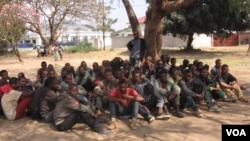Authorities in Malawi are stepping up efforts to crack down on criminal syndicates that are aiding influx of illegal immigrants from Burundi, Rwanda, Somalia and the Democratic Republic of Congo.
While Malawi shares borders with Zambia, Mozambique, police records indicate many illegal immigrants find their way into the country through uncharted routes through the hills of northern Karonga district, which borders Tanzania.
“Normally, every two days we arrest these illegal immigrants entering into Malawi through Tanzania," said Almakio Daka, station officer at Karonga police station.
"Last Friday, we arrested 12 Somalis; on Sunday, we arrested three Burundians, and the day before yesterday, we arrested another three Rwandese," he said. "As I am talking now, [officers are] arresting about four Rwandese.”
Although many of those arrested claim to be seeking refuge from social and economic problems at home, some say the influx of unscreened illegal immigrants threatens Malawi’s security and could introduce the Ebola virus within its borders.
Regardless of the plights of individual immigrants, Daka says large-scale illegal immigration is enabled by international criminal syndicates that involve locals.
“There are Malawians who do not love their country," he said, referring to locals who draw income by agreeing to shelter the illegal aliens in their homes. "Some are given court bail, which means they are still aiding these illegal immigrants.”
According to Wavisanga Silungwe, chairperson of the "Karonga Business Community," an organization that has been described as an activist group by some Malawi media outlets, security officers are the ones largely responsible for the proliferation of the syndicates.
“My brother, don’t be cheated. We have got evidence whereby some of police officers have been involved in this kind of a deal," he said, citing the May 2014 Mzuzu city arrest of four officers for allegedly aiding the illegal entry of 25 Ethiopians into Karonga.
On September 4, the state-run Malawi News Agency reported the arrest of an army officer for allegedly aiding the illegal entry of 12 Ethiopians.
"There was a police officer inside that vehicle, [too]," he said. "Are we going to blame a driver just because he is a business person? No.”
Lawyer George Kadzipatike, who has represented some of those accused of aiding illegal immigrants, says Malawi's overly lenient anti-immigration are to blame.
“When one has been convicted of aiding and abetting the illegal immigrants, the maximum fine is MK25 [about $60]," he said, adding that people concerned about illegal immigration should lobby parliament for stiffer penalties.
Deputy national police spokesperson Mable Nsefula says officers have undertaken daily patrols along routes used by the criminal syndicates, resulting in the arrest of 123 illegal immigrants over the past three months.
Last week, Beston Chisamila, a top official within the Ministry of Internal Affairs and Public Security, announced plans to place more border posts between Malawi and Tanzania — a move he said would help seal all routes used by the illegal immigrants.









